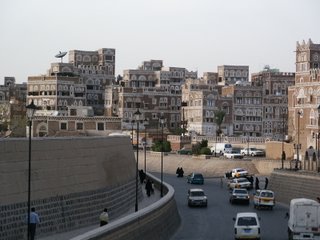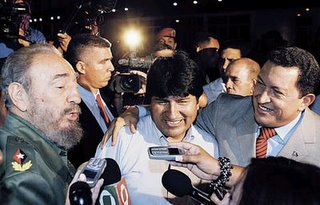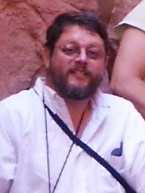
As I prepare for my return trip to Yemen next month, I decided to post this flashback:
In September of 2005 I took my first trip to Yemen – which was my first rural electrification project in the Middle East. Anyway, the trip from La Paz to Sana’a was smooth – at least as smooth as a 13,000 mile fifty hour trip over two days and two nights on airplanes (in economy class no less) can be. When I left Bolivia there was snow up in El Alto, enough to have postponed the flights the day before, but not enough to postpone or cancel the flights on the day that I was traveling (darn it.) My route took me from Bolivia to Miami to London to Dubai and then to Sana’a, Yemen. During my brief layover in London, which was just long enough to catch lunch, I was served my food by an obviously American waitress – it turns out that she was an Idaho girl who married an Irish guy and now lives and works in London, trying to save up to move back to Idaho where they can make ends meet. Small world.
On the leg between London and Dubai I watched a Bollywood (India’s Hollywood) movie (it had English subtitles) named “Swades”, which means “We The People,” in which the star plays an engineer from India who lives and works in the States for NASA (on the space shuttle.) Our hero gets word that his old nanny has been put in an old folks’ home back in India, so he takes off to find her and bring her back to American. Once in India he ends up taking some road trips around the country, setting up a hydro-power project to bring electricity to his nanny’s home village, and then falls in love with a pretty village school teacher. But then he goes back to NASA to launch the shuttle because he couldn't stand to live in India with all of their privations, hardships, and injustices. But after returning to NASA he decides it was really in his heart to go back to India to bring electricity to the rural villages and marry his Indian sweetheart. Strangely enough, I found the conflicts in the movie compelling – the whole conflict between the sexy aerospace electrical engineering job vs. just "lighting bulbs" and that of living in the third world vs. living in the comfy, clean, and functional USA.
Anyway, I finally arrived in Yemen without any significant problems. My first evening in Sana’a, the capital of Yemen, I got free to do a little walk-about. I left the hotel at 5:00 to take advantage of the last hour or so of sunlight to explore the old town, right across the street from my hotel. Whereas the drive from the airport to the hotel reminded me of Dhaka (albeit slightly less dusty and way less congested), the old city is something completely different – it really looked like the ancient Middle East. There is still the old thick adobe city wall around the old city, with watch towers at 100' intervals (I measured.) Until 1962 Yemen, and the old city of Sana’a, was closed to foreigners – now it’s a UNESCO World Heritage Site like the Taj Mahal. I wandered aimlessly through the ancient city streets and alleys to see what I could see. The old adobe and brick buildings are tall, usually six stories, and most have stained glass windows and are adorned with whitewashed trim. Sana’a is supposed to be one of the oldest cities in the world, reputedly founded by Noah’s son Shem right after the flood – and it looks like it could be about that old. The streets often narrowed down to alleys one person wide or just petered out to a dead end after making a spiral. In the middle of all of these sub-neighborhoods there were these green fields of gardens. In the middle of this maze I found an ancient hotel, the Taj Talha (originally an old palace), and, finding no one at the front desk, helped myself to their sixth story balcony (the stairs were tall and very uneven and the stair wells unlit, so that was an adventure in itself) to take some shots of the roof tops. I took a bunch of photos – they turned out pretty good – I can’t wait to show them to you.
As unsure as I was, wandering around a new place, and in the Middle East no less, I never felt threatened or ever heard a discouraging word. I saw that the men either wear long white robes or lungis (sort of a wrap-around skirt) with suit coats and the red and white checked Arab scarves on their heads, and most with a large curved Yemeni ornamental dagger stuck in the front of their belts (you know that I bought a couple of those to bring home.) Like in Bangladesh, the men are tall and skinny and walk around holding hands – they’re so cute. The little boys and girls were all running around in western clothes and playing with round gaskets or even roundish rocks – just as darling as they could be. The school aged young women wore robes with scarves on their heads, the girls over twelve wore black burquas with veils with slits for their eyes, and I noticed that the old ladies wore paisley burquas and veils. Lots of kids said “Hi” as I walked past, and a couple of men stopped to chat with me (they were all amazed to meet someone from the US – I guess they don’t get very many tourists from the US), but I confess that I was surprised when one young woman in a black burqua winked at me through the slit in her veil and said “Hi” in English. When it got dark (at around 6:30) I decided that it was time to find my way back to my hotel – just then all of the mosques sounded the call to prayer – it really took me back to our Dhaka years.
The next day I spent an interesting afternoon at the market in the center of the Old Town – it was a market for locals, with precious little tourism (although I did actually see a tour group – I think they were from Italy.) The market had clothes and shoes, groceries, food, spices (very aromatic – they made me sneeze), jewelry, and daggers (I got the kind like I’ve seen the locals wearing, not the overly-ornate kind that they sell for the tourists.) I couldn’t help but notice that many of the men had their cheeks stuffed clear full of this local narcotic leaf – called Qat – kind of like coca in Bolivia, or the betel nut in Bangladesh, or tobacco back in America. At about my second shop I picked up a local “guide”, so I took off and tried to ditch him. He showed up a little later at another shop where I’d already negotiated the purchase of one of those ornamental daggers I fired my wanna-be guide as soon as closing the deal with the shop keeper, and then almost immediately picked up a couple of boys as my guides. Sigh. I guess there’s no hiding the fact that I’m a foreigner – maybe it’s because I was taking photos. Along the way I picked up 50 grams of myrrh, for what I don’t know, since we’re not the incense type – but what the heck, here I am in Yemen – if they sold frankincense I’d have bought that too. As I left the market a smiling man came running up to me and handed me a small stack of pamphlets in English about Islam.
My job in Yemen is to work with a team to develop a national electrification strategy. It was obvious to me that our clients were not prepared to receive us however excited they were to have us in town (the most excited were the guys who had taken a field trip to Bangladesh to see our extensive rural electrification projects there.) Our own ministry contact, and his German consultant, were both preoccupied with wrapping up their previous project – the Sana’a “Emergency” Electrification study that was started in 1998 (I guess when they first noticed a lack of generation capacity and started load shedding.) I had to wonder, if it takes seven years to study an “emergency”, how long will they take with our “strategy” study? (We have ten months for our project.) It’s a challenge to work around the Yemeni schedule – they start work sometime after 9:00AM and then knock off for the day at 1:00PM (and this is before Ramadan) – so you have to squeeze in any and all meetings within that four hour window – usually just enough time for one meeting per day. One day, as I was in a meeting out at the Ministry, I heard sirens outside the window and looked out and saw a military jeep screaming by with two guys up front and one standing up in the back manning one of those swivel mounted machine guns like in the old “Rat Patrol” (you may be too young to remember that – I was pretty little when I last saw it.) Over the course of my two weeks in Yemen I saw those WWII relics zipping all over the place – it made me wonder what they were fighting.
We were assigned an office in the corner of the basement of the Ministry building in which to work between appointments. There is an office girl from Ethiopia, named Raquel, assigned to work with us – she brings us drinking water and such – she wears a burqua but not a veil (the brazen hussy.) At one point in the day I decided to embark on an adventure and asked about a bathroom. I was told it was up on the second floor, on the “right side”, but I’d need a key. So Raquel got her keys out, went into what looked like a storage room, opened the desk in there and dug me out the key to the bathroom somewhere upstairs, on the “first floor” (which meant the second floor), “to the right.” So I headed up the two flights of stairs and started making right turns. None of the signs, which are all in Arabic, looked like “Men’s Room” so I finally asked someone who knew English. They directed me to this hidden door, tucked away in an alcove in the corner of a hallway – if you didn’t know it was there, you’d never find it. That was my big adventure for that day.
One of the guys on our project team lived in Yemen as a boy. His father was the first American diplomat to come to Yemen back in the late 40’s and opened relations there. In fact, he showed us a National Geographic magazine from 1947 with an article in it by his dad with these great old photos from another century. And then his dad was the first US ambassador to Yemen in the mid 60’s, which is when he lived there as a teenager. He told us about how he witnessed the last public execution in the town square back in 67 or so. But, all told, the Yemenis seem to be nice – they were called “Arabia Felix” by the Romans, which means “Happy Arabia.”
One evening, over dinner, our team talked politics with our team leader, who was born in Peru but raised in the States, and is currently living and working in Burma. She posed the question: what if you could choose what country to be born to in Latin America, but you couldn’t choose whether you would be born rich or poor, what country would you choose? Almost all Latin Americans would choose Cuba, because the people there are the most equal. In the rest of Latin America, there are very few well off, and they’re mega-rich – I’m talking buy and sell both you and me rich. But the vast majority of the population in Latin America are mega-poor, and if you’re born poor, life is horrific and there is no getting better. It gave me a whole new perspective on why Fidel Castro and Che Guevara are such heroes in Latin America, even though the communist economic system has been such a failure world-wide. Their economy may be failed, but at least they’re all poor together. That helps me understand why such a large percentage (20-30%) of Bolivia is siding with the MAS party (the consortium of Cuba, Venezuela, and the drug lords of Colombia) – because however bad it is, it looks good compared to what they have now.
On my birthday, the 22nd, (it was a Thursday, which is Saturday in Yemen, so I didn’t have meetings) I woke up with such a sore back that I could hardly breathe – it felt like I had a dagger right under my left shoulder blade. So, I decided to buy myself a birthday massage – anything for my poor back. So I dragged myself down to the hotel’s Health and Beauty center and signed up for a 40 minute Swedish massage. That was my first massage in my whole life. I had a burly Arab guy work me over with a liberal dose of oil. I must say, the whole thing made my back feel much better – I think maybe I now understand why people go to chiropractors. Anyway, when I went to pay for the massage they told me “no charge”. And apparently all of the hotel staff were informed that it was my birthday – so I was wished a happy birthday by everyone. They even gave me a special request (not on the menu) for dinner – they served me Dum Aloo Kashmiri (an Indian dish of potatoes stuffed with white cheese, nuts, and raisins, in a spicy red creamy sauce) with Basmati rice, and a chocolate birthday cake after.
While I was in Yemen, I made three daytrips out to the countryside, to check things out first hand – thank heavens for Dramamine and Tylenol. On the first field trip two of us went from my company, along with three German consultants to the Ministry, and a couple of Ministry guys. We went in two cars – I rode with the Germans and our team leader rode with the Yemenis. The Yemeni car led the way, and our German car followed. On our way out of town we took a small detour and passed by the famous “rock palace” – the Wadi Dah – the summer palace of the Imam that ruled Yemen as a king until the early 60’s. It was good to see it in person since its image graces everything in town, including the water bottles. About every five kilometers or so we passed through a military checkpoint, but the Ministry guy in the lead car talked our way through and we went on our merry way. We drove about 140km west, down a very hilly and windy but thankfully largely paved road, to the town of Al Mahweet. Along the way we passed through or by these most amazing little villages. The Yemenis like to build their communities, usually extended family groups, up on top of hills or cliffs. Imagine Shiprock or Round Rock with a community on top. Their little houses aren’t so big in the footprint, but almost always go up four or five or even six stories – straight up. So all of these tall, skinny buildings will be crammed right up against one another and will form a closed square with only one gate into the whole community. I guess that’s all for protection against robbers or whatever. We also drove through orchards and orchards of Qat trees – Qat is the leaf that the Yemenis chew like coca. I asked them about it and was told that it’s a stimulant and appetite suppressant and a natural Viagra. So then I asked about the downside of the leaf and was told that Yemenis have a high instance of tooth decay and kidney failure which is linked to the Qat. I was also told that another problem with all of the Qat growing is that it has supplanted all of their food crops – so now the Yemenis have to import every kilo of rice, wheat, sugar, etc. Anyway, all around the Qat orchards are these stone guard towers, so the armed guards can make sure no one is stealing their Qat. Qat is very expensive – our Ministry guys bought 1.5kg bags for 3000Rs (or about $15) – that’s an expensive habit.
Anyway, we finally arrived in Al Mahweet and we stopped at a hotel for lunch. As we got out of the cars I noticed that a third car, that had been following us most of the way, stopped and several guys got out with AK-47’s. Apparently these were also part of our entourage – thanks to the Minister. Just then it was prayer time, and it was a Friday after all (Friday is Sunday in the Moslem world), so our Yemeni guides excused themselves to go to the mosque for a few minutes, while we infidel foreigners relaxed out in a tent up on the roof of the hotel. The tent was made of thick Persian-looking carpets, and all around the edge of the tent were these couch type pieces of furniture, flat on the ground and about 4” thick. So as we sat around our team leader told me that in the lead car our Ministry guide would tell the soldiers at the security checkpoints that he was accompanied by five German consultants – he then explained to her that due to pressure from the US Embassy, Americans have to register at every checkpoint, which takes about 30 minutes per stop, so the government can track the movements of US citizens in case we get kidnapped. Whew! I’ve never denied my American citizenship before, but I was glad that we didn’t lose a half hour for every five kilometer segment of our 260km trip that day. Anyway, lunch was good solid Yemeni food – chicken, mutton, naan (an Indian bread, like Navajo fried bread, but baked stuck on the side of a hot oven), spicy soup, etc. After lunch we went to visit the town’s generating station – it was as big of a mess as one might expect. Then we went to the house of the area manager for a Qat session – again the low couches around a long narrow living room, where everyone sat around chewing the Qat, with silver spittoons. I declined to join the group in a chew, but took the opportunity to ask questions about the utility in the rural areas (I’ll spare you the details.) After that, it was essentially straight back to the hotel, with just a few stops along the way for photos of scenic villages – I took a ton of photos and probably not enough.
My second field trip, which was over 400km round trip, was to visit a couple of small, isolated distribution systems not run by the State utility. We went in a mini-van – there were two Germans, myself, and four Yemenis. We didn’t have a gun car following us this time, but our driver was packing heat, so I guess we were protected. Speaking of our driver – we got to share his blaring Lebanese music both ways – he constantly rotated tapes as one would finish, but they all sounded the same to me – I imagine that our music sounds the same to them too. Having left “early” that morning, at 7:30AM, we stopped after about an hour of traveling to eat second breakfast. Our restaurant was a roadside place, where they chopped up the meat fresh and grilled it fajita style and served it with giant naans – I just thought of it as a fajita. You knew the meat was fresh because the calf’s head was still on the counter and his eyes hadn’t even glazed over yet, and his two friends, who were next in line for the breakfast rush, were tied up right next to the porch there where we ate. You know that I’m pretty macho about knowing where my meat comes from, but the image was almost too much for even me to enjoy my meal. Anyway, we got to see a lot more cool hilltop villages along the way – I took more photos. Every village that we passed through or by had speed bumps in the road, installed by kids who were selling their produce to all of the cars passing by. At one point in the journey (at 70km from Sana’a) a cryptic symbol lit up on the dashboard, so our driver whipped out the vehicle’s manual and we figured out that it was indicating that we needed more coolant. So, we poured a couple of water bottles into the radiator and we continued on our way. At the actual power company, an independent local operation, they said that they were tired of being in business and really wanted the national power company to come in and take them over. Then we went to a second place, where their manager was recently killed in tribal conflicts, but couldn’t find anyone to talk to (note to self: don’t cross tribal boundaries with our projects.) So we found a local place for lunch – here again it was typically local and it was all eating with your hands – chicken, veggies, naan, etc. I guess I’m OK with the whole eating with my hands thing by now – at least I know enough not to eat with my left hand (I had to keep reminding my other infidel traveling companions.)
My third trip out to the field was with the construction department. We had made an appointment for them to pick me up at 8:00 that morning, and at 8:30 I called them because they hadn’t shown up yet. I think I woke the guy up when I called, but he said he’d be by at 9:00. As I was sitting on the front porch of the hotel waiting for my ride, a funeral procession went by. There was a guy with a big stick at the front of the group leading the singing – they were carrying the dearly departed on a litter high over their heads, taking turns holding it up – they had traffic backed up for blocks on the busy road running in front of the hotel. Anyway, it was actually after 9:30 when my guys eventually showed up. This time it was just two Yemeni engineers from the construction department and me in an old Toyota Land Cruiser (the little two seaters.) The whole trip was a lot more casual than the two before – just a small group of engineers going out to the field. We didn’t even have a pass from the Ministry for the security checkpoints and they didn’t bother to lie about me being an American – and we just soldiered on without any major delays. This time we took the road south west out of town, over hill and dale – very rocky hills and dales I must say. The hills were covered with agricultural terraces – they were impressive. I think the Incas must have learned their craft from the Yemenis – they have terraced all of these steep craggy mountains – it reminded me a lot of Peru.
After we’d gone about 113km (according to my GPS) and made several stops to check out recently constructed projects, we put our Land Cruiser in 4WD and turned off the pavement. We picked up a local guy who acted as our guide and he directed us to where the line crew was working, but when we got to the work site we found that our boys had all gone off to lunch. So our guide directed us to the place where we were to have lunch. After we rounded one hill he pointed to the top of the far hill and said something in Arabic, but I surmised that we were headed up there. After 10km of four wheeling we finally arrived at the top of the hill and the end of the road, at the doorstep of the 500 year old castle on the hill. I thought that it was an interesting place for a restaurant, certainly the most interesting place I’d eaten in my three field trips. Inside we removed our shoes and went into a long living room, with the floor level couch cushions, where we rested for a few minutes. Then an old man in a red and white checked turban and a long white robe came in and, as I shook his hands I was told that he was the local sheik. Then everyone else gave him ceremonial kisses on both cheeks and then a forehead to forehead bonk. Boy, did I feel stupid – I only shook his hand – I wish someone had told me that we were eating at the house of the local sheik and just how to greet him properly. So, I hope he just chalked it up to me just being a stupid American who’s never traveled in the Middle East before. Anyway, after washing up we were led to the room across the hall where there were more cushions on the floor and a low round table in the middle of the floor. My two Yemeni guides immediately moved the pile of food from the table to the floor, uncovering a pot of naan soaked in honey. So we ate our dessert first. Then we had joints of beef, rice, plain naan, and corn bread naan – it was all good and easier to eat with our hands than it would have been if we’d been supplied flatware.
After eating and washing up, we went back into the living room for the post dinner Qat session. I tried to find a seat at the back of the room where I could hide out for the duration, but was guided to the seat up front right next to the sheik. The sheik didn’t speak English, and I don’t speak Arabic (more than “hello” and “thank you”,) so I tried to carry on a conversation with our host through my Ministry guide, but my engineer was constantly on his cell phone, so it was hard to make a very coherent conversation. I was trying to occupy my host who kept offering me Qat, a pull on his hookah (a water pipe with a ten-foot long velvet hose, full of tobacco or hashish I don’t know), or even tea. I was finally able to communicate through my translator (who didn’t speak much English either) the facts of my religion and after that the offers for the various mind altering substances slowed down, and then shifted to an invitation to spend at least three days with the sheik in his house. I thanked him for his kind offer and told him I’d have to take him up on his offer after a trip back to Sana’a for an appointment that night. We had a laugh and then we headed on our way.
The whole point of this long trek to the field was to see Yemeni linemen working, and sure enough, by the time we got to the work site they were done for the day. But they hadn’t left the area yet, so my guides made the linemen go back up the pole to show me their prowess. In demonstrating their agility to me they broke every rule in the book – we maybe not all of them – they did at least have hardhats. But other than that, they didn’t show me anything positive to put in my report. Plus, when I asked to see the design sheets from which they were working, I found that the linemen build the line according to their own criteria, without being encumbered by designs from the home office – so now I don’t know what the engineers do, but I do know that they don’t design the power lines. After that, it was just the long drive back to town. Coming back into the city that night (at dark-thirty) it was really pretty – the streets and buildings were all festooned with Christmas lights and all of the buildings draped with red, white, and black bunting – the day before (Monday the 26th) was Revolution Day.
It was interesting to work in Yemen and to see that it suffers from the same poverty-related issues as Latin America, Africa, and Asia. There seems to be a high correlation between corruption and poverty – maybe that’s so obvious that it’s understood, but I’m not sure I’ve ever read a study on the subject. Anyway, in Yemen, like most undeveloped countries, they use a lot of wood for cooking and heating, and consequently their land is largely deforested, causing them to forage further and further from home (currently an average of 2km, costing 100 hours per month) and creating respiratory problems from the smoke in the house (imagine an open fire pit in the corner of the kitchen with no chimney.) There are also the high incidence of children burning themselves with the kerosene lamps that you see in other places, like Bolivia. Also, their government’s program of fuel subsidies, targeted to help the poor of the country, is not only an unsustainable burden on the national treasury, but is also misdirected in that a large portion of the fuel gets smuggled to neighboring countries across the Red Sea where the fuel isn’t subsidized. In the rural areas they use animal dung as a fuel source, which means that it can’t be used as a fertilizer, which in turn affects crop quality. Access to electrification is at around 50% nationwide, and less than 40% in the rural areas (they have over 100,000 villages without electricity.) Those homes that have electricity have an average consumption of only 100kWh/month, compared to over 1000kWh/month in the States (but considerably more than the 30kWh/month in Bolivia or Bangladesh.)
On my last day in Yemen, a Thursday which is “Saturday” in Yemen, I wrote my trip report in the morning and then knocked off at lunchtime and took a little walkabout around old Sana’a with a newly arrived member of our team. So I took him up the streets that I’d discovered on my first few days in country – they were every bit as scenic as I remembered and it was hard not to retake all of the photos that I’d already taken. We went up to the roof of that old hotel that I’d visited before and got a panorama of the old city. Eventually we worked our way into the old market and started doing our souvenir shopping. After a couple of hours of wandering we decided that we were hungry, and tired of eating every meal at the hotel, so when we came across a kebab shop we decided to risk it. We ate in their little upstairs dining room and sat on the floor level couches with a bunch of locals already in mid-meal. We scrunched in with the men – the women were behind a curtain on the other side of the room. They brought us up a plate of meat (lamb?) cooked on skewers over a very hot fire, so I think it was sterile. We ate our seared meat with these little breads, kind of like fat pitas, and a freshly ground tomato sauce (probably what was not safe to eat.) It was very tasty. We washed it all down with a luke-cold Coke, which should kill any bacteria in my stomach. It was fun rubbing elbows with the locals – they were all very friendly and accommodating, although we couldn’t actually speak to one another except in sign language and smiles. My companion, not taking any chances, sensibly stopped at a pharmacy on the way back to the hotel and picked up some tummy antibiotics. As for me, the warm Coke seems to have done the job adequately.
Over the two weeks I was in Yemen we got two warnings from the American Embassy about “credible” threats to Americans in the region and in particular in Yemen. I’ve got to say that it would be much less stressful working in those places if the Embassy didn’t put out so many dire warnings. Back in the “small world” department, at the hotel in Sana’a I ran into an old friend of mine from Dhaka – he’s from the Canadian Aid Agency and was in Yemen to check out some education projects. We had dinner together a couple of nights – it was fun to get caught up.
On my way back home to La Paz I had a brief layover in Dubai, United Arab Emirates (on the tip of the east side of the Arabian peninsula), just long enough to have lunch. As I ate my lunch the waitress made small talk: “Where you go, Mister?” To London. “Wow. I only go to London in my dreams.” It really made me reflect – I remember when traveling to London was a dream – it was not so many years ago, before it became a routine stop in the middle of a long trip to somewhere else. Anyway, after another two days of travel I finally wound up back home in La Paz.
The photo that I've posted above is of my first view of old Sana'a. It's impressive that these folks were building six story adobe skyscrapers back when Europe was living in caves. I'll reserve comment about relative development since then.








